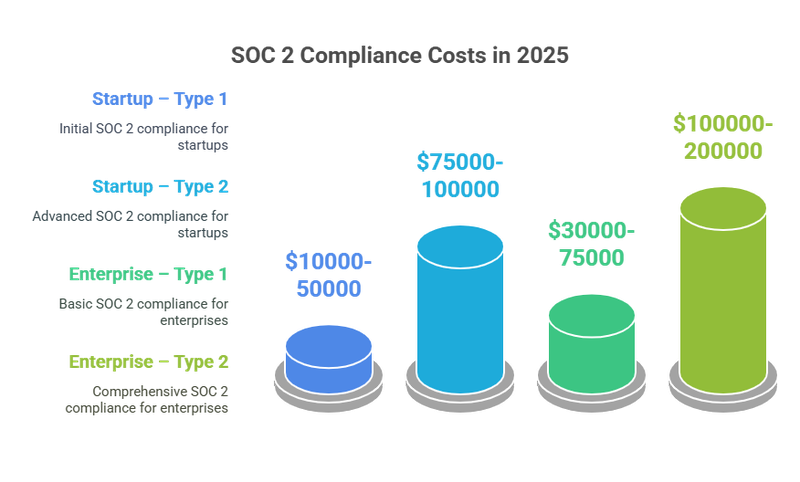SOC2 Certification Cost: How to Save Time & Money with Automation


Getting SOC2 is proof your organization handles customer data responsibly. But before you start, you need a realistic sense of the costs (both time and money) and how automation can dramatically change the equation. Below is a clear, human-friendly guide to SOC2 certification costs, with practical steps to get started.
SOC2 Compliance Costs: How Much Time and Money Is Involved
- Audit fees (what you pay the auditor): Expect a very wide range depending on scope and Type. Audits commonly run from the low-five figures into six figures for large or complex orgs. Type 2 (the longer observation period) is typically more expensive than Type 1.
- Total program cost (people + tools + remediation): When you add readiness work, consultants, tools, staff time and remediation, many companies budget $30k–$80k in the first year as a reasonable estimate, with smaller startups often at the lower end and larger firms higher.
- Time investment: From first prep to a completed Type 2 report, most organizations take 6–12 months (and sometimes longer) depending on existing controls and evidence organization. A Type 1 can be faster, often a few weeks to a few months for the audit itself, but the preparation still takes time.
SOC2 Certification Timeline Without Automation
If you do everything manually (no compliance platform), expect to spend significant staff hours on the following phases:
- Readiness & gap analysis (weeks to months): documenting current policies, mapping systems, and identifying gaps. Often requires cross-team interviews and manual evidence collection.
- Remediation & policy creation (1–4 months): implement missing controls, write/updating policies, apply access controls and encryption where needed.
- Evidence collection & monitoring (ongoing): collect screenshots, logs, change approvals, training records, typically a regular admin task for one or more team members.
- Audit period for Type 2 (3–12 months observation): auditor examines evidence across the observation window; you must maintain controls throughout.
Why this costs time: manual evidence collection is tedious and error-prone. Engineers and ops staff often spend hours pulling logs, screenshots, and attestations — time that otherwise goes into product development.
The Price of SOC2 Certification Without Automation

Breaking costs down so you can budget:
- Readiness assessment / gap analysis: typically $3k–$15k (varies by complexity and whether you hire consultants).
- Audit fees (CPA / audit firm): auditor charges vary widely, many mid-size companies see auditor fees in the $15k–$50k range for a single audit; complex or enterprise engagements can exceed six figures.
- Tools & security investments: new logging, monitoring, IAM upgrades, backup solutions, these can be $0 (if you already have them) to tens of thousands depending on gaps.
- Internal labor & opportunity cost: the hidden but real cost; your team’s time (product, engineering, security, HR) dedicated to compliance rather than roadmap work. Estimates vary, but many teams report full-time-equivalent (FTE) effort or significant periodic time.
Net result: without automation, first-year SOC2 costs (audit + readiness + tools + staff time) commonly land in the tens of thousands and often approach or exceed $30k–$50k for many organizations.
How automation changes the picture (and how it saves money)
Compliance automation platforms connect to your cloud, code repositories, identity providers, and ticketing systems to continuously collect evidence and surface gaps. Key benefits:
- Dramatically less manual evidence work: automation pulls logs, checks configurations, and generates attestations, reducing staff hours.
- Faster readiness → cheaper audit: better-organized evidence speeds the auditor’s work and reduces audit fees and surprises. Many vendors and firms report faster timelines and lower overall cost when automation is used.
- Continuous compliance = lower recurring friction: instead of a scramble once a year, you maintain controls continuously, making subsequent audits smoother and cheaper.
Typical platform costs: automation platforms are not free, pricing often scales with org size and features. Market references show wide ranges (e.g., some plans and packages starting around the low thousands to many tens of thousands annually depending on team size and scope). Compare that cost to saved labor + potentially lower audit fees to evaluate ROI.
How to get started with SOC2 automation (practical step-by-step)
- Do a short gap analysis (internal or with a consultant). Identify the top gaps that block audit readiness. If the budget is tight, aim for a minimal readiness assessment.
- Choose 2–3 candidate automation vendors. Look for integrations you need, reporting features, and auditor-compatibility. Ask vendors for case studies in your industry.
- Run a trial / pilot on a small scope. Connect a few systems, let the platform collect evidence for 30–60 days, and see how much manual work it replaces.
- Remediate found gaps in priority order. Fix high-risk items first, access control, encryption, logging. Track changes in the automation platform to generate evidence.
- Engage an auditor early. Talk with an auditor to confirm your planned scope (Type 1 vs Type 2) and evidence needs — it avoids surprises later.
- Move to continuous mode. Once live, use the platform’s dashboards for ongoing monitoring and to keep evidence audit-ready year-round.
Conclusion: Plan realistically, automate wisely
SOC2 is an investment in trust. If you try to do it entirely manually, expect significant staff time and a first-year price tag frequently in the tens of thousands; with automation, you can shorten timelines, reduce manual labor, and often lower total cost of ownership, at the price of a subscription. Start with a focused readiness assessment, evaluate automation vendors by integration fit, and bring an auditor into the conversation early.
Why waste time and money on manual audits? Choose Regulance to automate your SOC2 process and reduce certification costs.